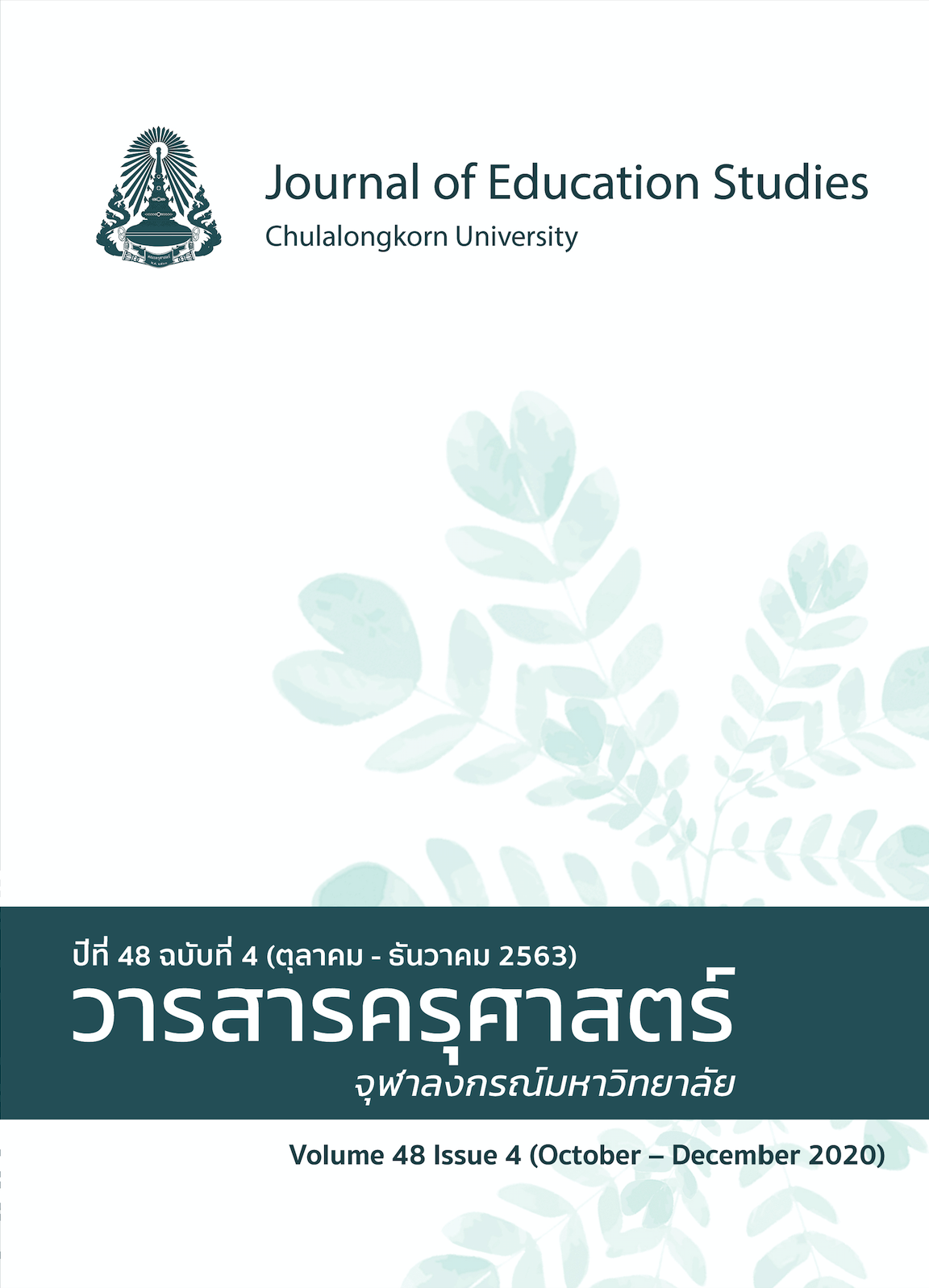Effects of Using Diet and Exercise Programme Based on Theory of Reasoned Action to Prevent Obesity of Overweight Elementary School Students
DOI:
https://doi.org/10.14456/educu.2020.16Keywords:
diet and exercise programme, overweight, obesityAbstract
The purpose of this study was to examine the effects of using a diet and exercise programme based on the theory of reasoned action to prevent obesity among overweight elementary school students. The samples were 40 overweight elementary school students divided into 2 groups; 20 students in the experimental group from Watphrayayang School, and 20 students in the control group from Watduangkhae School. The research tool was an exercise practice assessment form and weighing scale. Data were analysed by means, standard deviations and t-test. The research findings found that 1) the mean scores for food consumption and exercise practice among the experimental group were significantly higher after the programme than before at the .05 level, 2) the mean scores for food consumption and exercise practice among the experimental group were significantly higher than the control group after the programme at the .05 level, 3) the mean scores for weight among the experimental group were not significantly different after the programme compared to before at the .05 level, and 4) the mean scores for weight among the experimental group were not significantly different from the control group after the programme at the .05 level.
References
กรมอนามัย. (2542). การเจริญเติบโตของเด็กไทยตั้งแต่แรกเกิด –18ปี กราฟแสดงเกณฑ์อ้างอิงการเจริญเติบโตเด็ก. http://nutrition.anamai.moph.go.th/temp/main/view.php?group=1&id=315
ณัฐวุฒิ ฉิมมา. (2556). ผลของโปรแกรมส่งเสริมสุขภาพตามทฤษฎีแรงจูงใจเพื่อป้องกันโรคที่มีต่อการลดน้ำหนักและเปอร์เซ็นต์ไขมันของนักเรียนประถมศึกษาที่มีภาวะน้ำหนักเกิน [วิทยานิพนธ์ปริญญามหาบัณฑิต]. Chulalongkorn University Intellectual Repository (CUIR). http://cuir.car.chula.ac.th/handle/123456789/43146
ดนิตา ภาณุจรัส. (2552). Junk food หรือ อาหารขยะhttp://www.classifiedthai.com/content.php?article=1010
ธีระพร อุวรรณโณ. (2535). ทฤษฎีและการวัดเจตคติ. จุฬาลงกรณ์มหาวิทยาลัย
นฤมล ลีลายุวัฒน์. (2553). สรีรวิทยาของการออกกำลังกาย= Physiology of exerciseมหาวิทยาลัยขอนแก่น.
ฝ่ายโภชนาการศิริราชพยาบาล. (2555). โภชนาการในเด็กวัยเรียน. มหาวิทยาลัยมหิดล.
พงศกร สังข์เงิน. (2556). ผลของการจัดโปรแกรมสุขภาพที่มีต่อน้ำหนักและเปอร์เซ็นต์ไขมันของนักเรียนประถมศึกษาที่มีภาวะน้ำหนักเกิน [วิทยานิพนธ์ปริญญามหาบัณฑิต]. Chulalongkorn University Intellectual Repository (CUIR). http://cuir.car.chula.ac.th/handle/123456789/44523
พรสุข หุ่นนิรันดร์. (2545). เอกสารคำสอนวิชา สข 531 พฤติกรรมศาสตร์ทางสุขศึกษา [เอกสารไม่ได้ตีพิมพ์]. คณะพลศึกษา, มหาวิทยาลัยศรีนครินทรวิโรฒ.
รังสรรค์ ตั้งตรงจิตร. (2550). โรคอ้วน การเปลี่ยนแปลงทางด้านโภชนาการและชีวเคมี. เจริญดีมั่นคงการพิมพ์.
วีนัส ลีฬหกุล, ถนอมขวัญ ทวีบูรณ์, และ สุภาณี พุทธเดชาคุ้ม. (2545). โภชนศาสตร์ทางการพยาบาล. บุญศิริการพิมพ์.
ศัลยา คงสมบูรณ์เวช. (2550). กินอย่างไร ไม่อ้วน ไม่มีโรค. อัมรินทร์พริ้นติ้งแอนด์พับลิชซิ่ง.
ศิริรัตน์ จำปีเรือง. (2553). การให้คำปรึกษาทางสุขภาพ. Blogger. http://sirirut2003.blogspot.com/2010/01/blog-post_5146.html
สมโภชน์ เอี่ยมสุภาษิต. (2541). ทฤษฎีและเทคนิคการปรับเปลี่ยนพฤติกรรม. โรงพิมพ์แห่งจุฬาลงกรณ์มหาวิทยาลัย.
สำนักงานสถิติแห่งชาติ. (2556). สรุปสำหรับผู้บริหาร การสำรวจพฤติกรรมการบริโภคอาหารของประชากร พ.ศ. 2556. http://service.nso.go.th/nso/nsopublish/service/survey/healthCare_56.pdf
สำนักโภชนาการ. (2553). การส่งเสริมภาวะโภชนาการหญิงตั้งครรภ์และการเจริญเติบโตของเด็กอายุแรกเกิดถึง 18 ปี. http://nutrition.anamai. moph.go.th/temp/files/K-center/re01.pdf
สำนักระบาดวิทยา. (2552). ภาวะอ้วนในนักเรียน ปี พ.ศ. 2548-2552 (Obesity situation in Thai student, 2005-2009). กรมควบคุมโรค. http://www.boe.moph.go.th/Annual/Annual%202552/AESR52_Part1/B_Part1_52/5452_ObesitySituation.doc
สุชาติ โสมประยูร และ เอมอัชฌา วัฒนบุรานนท์. (2553). เทคนิคการสอนสุขศึกษาแบบมืออาชีพ. ดอกหญ้าวิชาการ.
อรุณี เจตศรีสุภาพ. (2555). เด็กอ้วน เด็กน้ำหนักตัวเกิน (Pediatric obesity and overweight). หาหมอ.com. http://haamor.com/th/เด็กอ้วน-เด็กน้ำหนักตัวเกิน
ภาษาอังกฤษ
Ajzen, I. (2002). Perceived behavioral control, self-efficacy, locus of control, and the theory of planned behavior. Journal of Applied Social Psychology, 32(4), 665-683.
Ajzen, I., & Fishbein, M. (1980). Understanding attitudes and predicting social behavior. Prentice-Hall.
Center for Disease Control and Prevention. (2009). Obesity among low-income preschool children. http://www.cdc.gov/obesity/downloads/pednssfactsheet.pdf
Glanz, K., Rimer, B. K., & Lewis, F. M. (2002), Health behavior and health education (3rd ed.). Wiley.
Piaget, J., & Inhelder, B. (1969). The psychology of the child. Basic Books.
World Health Organization. (2014a). Childhood overweight and obesity. http://www.who.int/dietphysicalactivity/childhood/en/
World Health Organization. (2014b). Obesity and overweight. http://www.who.int/mediacentre/factsheets/fs311/en/#
Downloads
Published
How to Cite
Issue
Section
License

This work is licensed under a Creative Commons Attribution-NonCommercial-NoDerivatives 4.0 International License.




